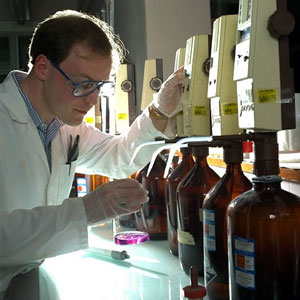Industrial Chemist
Tasks & duties

Industrial chemists may do some or all of the following:
-
develop experimental procedures and specialist equipment to enable analysis of chemical processes to be carried out
-
develop, manage and monitor chemical processes for the manufacture of products and materials
-
carry out quality control tests and environmental monitoring to check the safety, function and quality of products
-
work with marketing and management personnel on the production of consumer goods
-
test and monitor chemicals in food, water and the environment
-
write reports on findings
-
manage chemical technicians and a laboratory
-
purchase laboratory equipment
Skills & knowledge

Industrial chemists need to have:
-
knowledge of how to safely handle, store and produce large quantities of chemicals
-
knowledge of chemistry and chemical compounds
-
research skills
-
skill in analysing and interpreting research results and other information
-
practical skills for performing experiments and operating scientific equipment
-
problem-solving skills
-
planning and organisational skills
-
communication skills
-
writing skills, for writing reports and for publications
-
maths and computer skills
Entry requirements
To become an industrial chemist you need a Doctorate or a Masters degree in chemistry, biochemistry or a related science. Some industrial chemists may have technology or engineering training.
Secondary education
A tertiary entrance qualification is required to enter tertiary training. Useful subjects include maths, physics, chemistry, biology, computer studies and English.
Tertiary education
To become an industrial chemist you need a Doctorate or a Masters degree in chemistry, biochemistry or a related science. Some industrial chemists may have technology or engineering training.
Training on the job
Some skills are gained on the job. Industrial chemists must keep up to date with developments in the field through reading and attending seminars, courses and conferences. The Internet and sharing knowledge with other colleagues are also important sources of information.
Useful experience
Useful experience includes work as a chemical technician, research work and laboratory or scientific work in a hospital, medical school or Crown Research Institute.
Related courses
Ceramics, Industrial Glass and Rubber Manufacturing
Inorganic Chemistry
Laboratory Technology
Materials Engineering
Organic Chemistry
For more information, please refer to Career Services.
Document Actions
